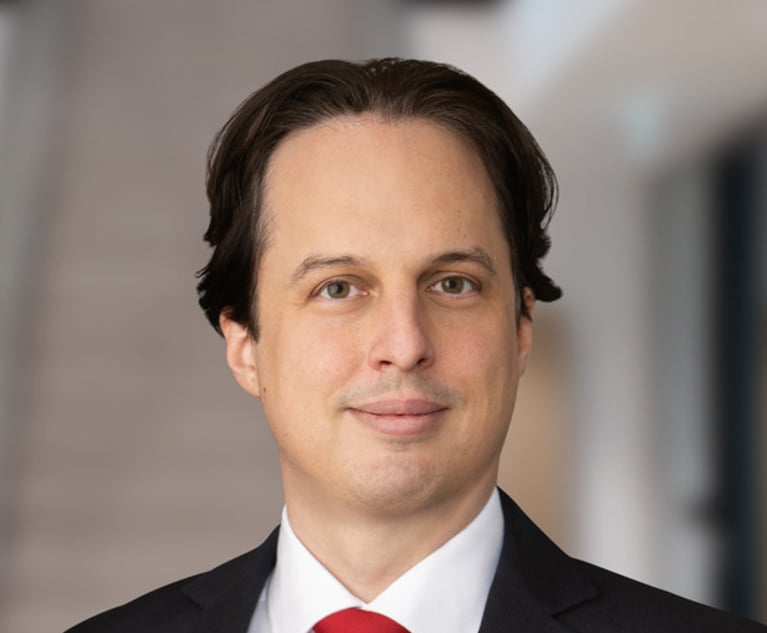A new breed of lawyer
Matthew di Rienzo a man with a clear aim: to manage and structure legal information to make it accessible to all
February 11, 1999 at 12:39 PM
7 minute read
Traditionally, career paths for budding lawyers have been limited – pupillage at chambers hopefully followed by a tenancy, or articles at a law firm culminating in an associate position.
But, in Tony Blair's words, there may now be a 'third way'. The 'legal information engineer' – no longer a concept confined to the writing of Richard Susskind – is fast becoming a viable option for young lawyers looking for an alternative form of employment.
One such lawyer, Matthew di Rienzo, is a key figure behind the creation of Clifford Chance's (CC) NextLaw online advice system.
Di Rienzo, 28, qualified as a barrister, but decided to quit his pupillage at Queen Elizabeth Buildings in the middle of 1994, initially seeking a return to academia in the shape of a masters degree followed by a PhD in English or philosophy.
But along the way he was side-tracked. Looking to make some money to fund his foray back to university, di Rienzo, a Cambridge law graduate, became involved with the newly formed legal publisher, New Law.
Di Rienzo says he was initially brought in to help create digests of judgments, but "by the end of that year, 1995, I had designed the company's online legal information service – an online mechanism on the Internet for delivering same-day judgments".
According to di Rienzo, by the time the online system was finally released in April 1996, it was the first fully Internet-based legal information service in the UK.
And, after spending time working with an "inspirational" German programmer at New Law, di Rienzo says he was hooked. "I discovered a love of computers and technology," he says.
While working on New Law's online service, di Rienzo came across Clifford Chance and Christopher Millard, the partner in charge of NextLaw, for the first time. CC was interested in the service, and Millard did some of the legal work for New Law.
By the end of 1997, di Rienzo was working for CC as a consultant on the NextLaw project.
"I was invited to come and work for them," he says. "When I came in, NextLaw was at a relatively early stage in terms of implementation.
There had been some projects the firm had been working on which needed to be integrated.
"It was quite a quick process.
I spent a month getting to know the firm and the information in NextLaw. I came up with a design and started the development process at the end of 1997, and NextLaw was officially launched at the beginning of May last year."
After the implementation of NextLaw, Clifford Chance and di Rienzo made their relationship permanent.
Last August, di Rienzo became online services research and development manager, working directly for Colin Potter, the partner in charge of online services at Clifford Chance.
He also works closely with Susskind, who, among his many jobs, acts as consultant to the firm.
"Obviously NextLaw was the first online service implemented by Clifford Chance, but as part of the commitment to further developments in this area we realised we needed a full-time role to systematically look at opportunities and design concepts," di Rienzo says.
He says his "wish to pursue academic work has not died", but he gets a great deal of intellectual fulfilment from his job.
"It's about structuring information. Making it easily available. There is a massive information overload people are presented with – not just through the Internet, but newspapers and broadcasting.
I'm fascinated by the ways technology can manage that overload and filter out its key aspects.
"It's particularly crucial in a business environment. Clients of Clifford Chance and other major law firms are busy, stressed people, who don't have time to sift through the vast array of information with which they are confronted.
"They need to get very quickly at what counts for them, usually what gives them a business advantage or ensures they comply with legal regulations."
Di Rienzo says he also satisfies his academic leanings through his work for the Society for Computers and Law (SCL).
He helped draft the SCL response to the Lord Chancellor's Departments (LCD) Civil Justice consultation paper, which called on the Government to provide free access to the law via the Internet.
"It's something I believe in," he says.
"The rule of law is central to society, and knowing the law and having access to law should be standard and seen as a right, and law comes from judgments and from statute, so people should have access."
However, di Rienzo stresses his old publisher colleagues will not suffer, because they add the value necessary to make law understandable. "It goes back to a process of filtering.
The publisher can guide the citizen or business through categorising the law and providing layman's summaries."
And it is here where di Rienzo sees the role of the publisher and the role of the law firm coming together.
He says the role of law firms will increasingly centre on making law understandable and available to its business clients through the Internet.
"The information at New Law was aimed at lawyers and was quite legalistic. What's important for a firm like Clifford Chance is to move away from services that are legalistic in basis, but are instead more business-focused.
That's the key, because there is no point producing a legal textbook online.
"The client doesn't need to know what the law is, only how the law relates to their practical circumstances, and what they need to do to make sure they're compliant.
That requires a quite different approach, and that's certainly the angle from which I come when looking at these systems.
"We are not in the business of practising law academically, we are providing business solutions.
In the future we will become so close to our clients – because we want to service them in the best way possible – that some of our business processes will accord with theirs, particularly in the legal and compliance areas."
He says it will also be the role of the law firm to tell clients when there are changes to the law or regulations rather than waiting for the client to come to them.
"Lawyers will become much more like business consultants for their clients. They won't just be reactive, they won't necessarily charge by the hour or minute at the end of a telephone.
"They will be proactive, in constant contact with their clients, re-engineering the processes by which their clients remain compliant with the increasingly vast array of regulations that beset them."
Di Rienzo is adamant that there has been little resistance from lawyers at CC to the idea of turning the firm's valuable legal advice into a commodity.
"At Clifford Chance there has never been hostility to the idea internally, but a recognition of the usefulness and potential power of online services. The particular interest has been in trying to identify the right services.
"There has been in some circles, not necessarily here but in the industry as a whole, the perception that lawyers will be replaced by computers. That's highly unlikely. It may be that some lawyers are replaced by computers, but not all.
"You will still need human contact. As long as people are making deals, you'll need human lawyers and advisers because it's part of a primeval process."
This content has been archived. It is available through our partners, LexisNexis® and Bloomberg Law.
To view this content, please continue to their sites.
Not a Lexis Subscriber?
Subscribe Now
Not a Bloomberg Law Subscriber?
Subscribe Now
NOT FOR REPRINT
© 2025 ALM Global, LLC, All Rights Reserved. Request academic re-use from www.copyright.com. All other uses, submit a request to [email protected]. For more information visit Asset & Logo Licensing.
You Might Like
View All

Kim & Chang, Freshfields, A&O Shearman Take Top Spots for Highest Collective Deal Value as APAC M&A Grew By Just 1% in 2024

Another Partner Exits Deloitte Legal—Former M&A Head Joins UK Top 50 Law Firm

KPMG Law US Targets Alternative Business Licence, Shaking Up Legal Status Quo
3 minute readTrending Stories
- 1TikTok Law and TikTok Politics
- 2California Supreme Court Vacates Murder Conviction in Infant Abuse Case
- 3New York’s Proposed Legislation Restraining Transfer of Real Property
- 4Withers Hires Lawyers, Staff From LA Trusts and Estates Boutique
- 5To Speed Criminal Discovery, NY Bill Proposes Police-to-Prosecutor Pipeline For Records
Who Got The Work
Michael G. Bongiorno, Andrew Scott Dulberg and Elizabeth E. Driscoll from Wilmer Cutler Pickering Hale and Dorr have stepped in to represent Symbotic Inc., an A.I.-enabled technology platform that focuses on increasing supply chain efficiency, and other defendants in a pending shareholder derivative lawsuit. The case, filed Oct. 2 in Massachusetts District Court by the Brown Law Firm on behalf of Stephen Austen, accuses certain officers and directors of misleading investors in regard to Symbotic's potential for margin growth by failing to disclose that the company was not equipped to timely deploy its systems or manage expenses through project delays. The case, assigned to U.S. District Judge Nathaniel M. Gorton, is 1:24-cv-12522, Austen v. Cohen et al.
Who Got The Work
Edmund Polubinski and Marie Killmond of Davis Polk & Wardwell have entered appearances for data platform software development company MongoDB and other defendants in a pending shareholder derivative lawsuit. The action, filed Oct. 7 in New York Southern District Court by the Brown Law Firm, accuses the company's directors and/or officers of falsely expressing confidence in the company’s restructuring of its sales incentive plan and downplaying the severity of decreases in its upfront commitments. The case is 1:24-cv-07594, Roy v. Ittycheria et al.
Who Got The Work
Amy O. Bruchs and Kurt F. Ellison of Michael Best & Friedrich have entered appearances for Epic Systems Corp. in a pending employment discrimination lawsuit. The suit was filed Sept. 7 in Wisconsin Western District Court by Levine Eisberner LLC and Siri & Glimstad on behalf of a project manager who claims that he was wrongfully terminated after applying for a religious exemption to the defendant's COVID-19 vaccine mandate. The case, assigned to U.S. Magistrate Judge Anita Marie Boor, is 3:24-cv-00630, Secker, Nathan v. Epic Systems Corporation.
Who Got The Work
David X. Sullivan, Thomas J. Finn and Gregory A. Hall from McCarter & English have entered appearances for Sunrun Installation Services in a pending civil rights lawsuit. The complaint was filed Sept. 4 in Connecticut District Court by attorney Robert M. Berke on behalf of former employee George Edward Steins, who was arrested and charged with employing an unregistered home improvement salesperson. The complaint alleges that had Sunrun informed the Connecticut Department of Consumer Protection that the plaintiff's employment had ended in 2017 and that he no longer held Sunrun's home improvement contractor license, he would not have been hit with charges, which were dismissed in May 2024. The case, assigned to U.S. District Judge Jeffrey A. Meyer, is 3:24-cv-01423, Steins v. Sunrun, Inc. et al.
Who Got The Work
Greenberg Traurig shareholder Joshua L. Raskin has entered an appearance for boohoo.com UK Ltd. in a pending patent infringement lawsuit. The suit, filed Sept. 3 in Texas Eastern District Court by Rozier Hardt McDonough on behalf of Alto Dynamics, asserts five patents related to an online shopping platform. The case, assigned to U.S. District Judge Rodney Gilstrap, is 2:24-cv-00719, Alto Dynamics, LLC v. boohoo.com UK Limited.
Featured Firms
Law Offices of Gary Martin Hays & Associates, P.C.
(470) 294-1674
Law Offices of Mark E. Salomone
(857) 444-6468
Smith & Hassler
(713) 739-1250






